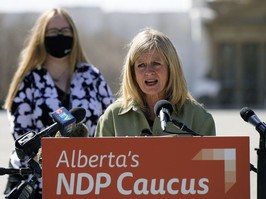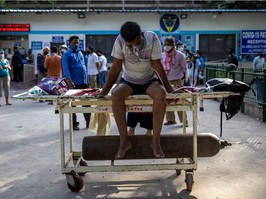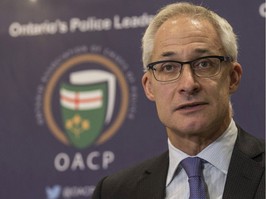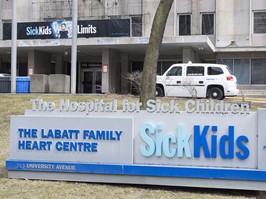newfoundland sending medical staff to ontario to help in pandemic
the deployment of military personnel is still to be determined.
we apologize, but this video has failed to load.
try refreshing your browser, or
tap here to see other videos from our team.
tap here to see other videos from our team.
by: david pugliesenewfoundland and labrador is sending nine health-care workers to toronto while the canadian military is expected to provide another 36 medical professionals to help with the pandemic response in ontario.the nine health-care workers will be transported to toronto on tuesday by a canadian military aircraft. the deployment of military personnel is still to be determined.newfoundland and labrador premier andrew furey said he has been in contact with both ontario and federal officials. “i spoke with the prime minister on saturday, he was quite happy that newfoundland and labrador was leading the charge,” furey told journalists monday. “ontario is the centre of the country. we all have friends and family in ontario. and we all know that covid-19 does not respect any geographical borders.”among the team from the province is the premier’s wife, physician dr. allison furey, who has been working at the covid-19 assessment unit in st. john’s.military and department of national defence staff will be used in a variety of jobs, including administering vaccines, say defence sources. the personnel would be used to augment civilian medical personnel at ontario hospitals. federal officials haven’t provided numbers but defence sources estimate that around 36 military health care professionals will be freed up to work in ontario. that is in addition to other military staff to be used in more general duties.ontario solicitor general sylvia jones said monday at a news conference that the province did not request a specific number of personnel.“what we are looking for is very specialized nurses that can help out in our intensive care unit beds and medical personnel that can assist our hospitals that are seeing disturbing rises in cases of covid-19,” she said.jones said the request, made on friday, has been approved by the federal government.her office released a statement noting that the province has been examining health resources that could be sent to ontario. “at the conclusion of that process, we have made a request for the assistance of those identified resources, many of whom reside, for example, within the canadian armed forces and canadian red cross organizations,” the statement noted. “in addition to the health human resources, we are requesting logistical and operational support as we seek to augment our response to covid-19.”the bulk of the military personnel are expected to be sent to the toronto area.ontario reported 3,510 new covid-19 cases on monday and 24 deaths.toronto, with 1,015 new cases, peel, with 909, and york, with 391, remained the province’s worst-hit regions. durham reported 244 new cases.the canadian military was previously used in ontario to help out in long-term care homes.the federal government said monday in a news release that in response to ontario’s request it “is prepared to deploy federal health human resources, provide support from the canadian armed forces, and fund the redeployment of the canadian red cross to augment or relieve staff within medical care facilities.”the military is preparing to deploy up to three multi-purpose medical assistance teams, which are scalable healthcare provider teams primarily composed of nursing staff and medical technicians, the government noted. in addition other military personnel will be available for general support as needed.the canadian armed forces has approximately 160 civilian nurses and approximately 220 military nurses across the country. but those personnel are used to care for the 68,000 military personnel in the regular force as well as reserve force members on operations or full-time service.“they work largely in primary care nursing roles within the caf health-care system, while some are currently employed full-time within the civilian health-care system as part of professional exchange programs in order to maintain their skillset,” noted julia scott of the canadian forces health services branch. “there are additionally about 110 reserve force nurses, most of whom work full-time as civilian nurses. therefore, the caf cannot immediately deploy all of these nurses, as many are already employed within civilian hospitals.”unlike most canadians, the provision of health care to full-time military members and eligible reserve force members is the responsibility of the canadian forces and not the provinces or territories where they reside.
 3 minute read
3 minute read





